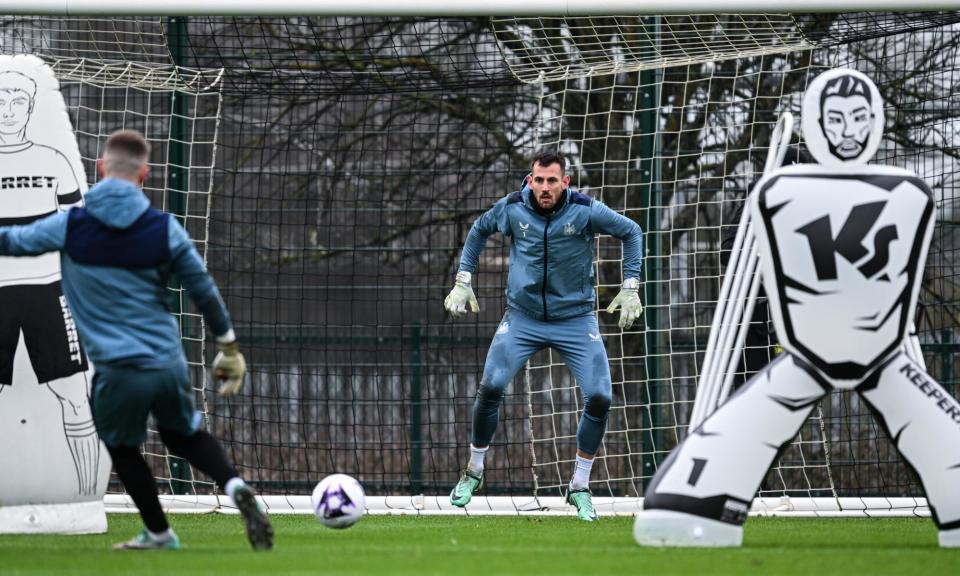How fast breaks have slowed Newcastle’s Premier League progress

Eddie Howe does not look, or behave, like a high-stakes gambler but appearances can deceive. In reality Newcastle’s otherwise rather conservative, invariably measured, manager has constructed such a risk-taking team that he readily agrees it is no coincidence his players have faced more fast breaks than any other Premier League side this season.
“There’s always a reason for these things and certainly our high press will be one of those reasons,” said Howe as he reflected on recent Opta statistics. “We’re always trying to limit the opposition threat; we’re going to have to be careful about it.”
Related: ‘There’s a buzz’: how Hull got their brio back to push for Premier League
Yet in recent weeks there has been precious little tactical circumspection on the part of a manager whose hard-pressing team have been caught on the counterattack so many times that they have conceded 27 goals in their past 11 Premier League games, while scoring 21.
Although often wonderful to watch, that is not sustainable for a team that retain hopes of European qualification but last kept a clean sheet in the league in mid-December. It also explains why Newcastle supporters are nervous before Saturday night’s visit to title chasing, latterly free-scoring Arsenal.
That fanbase has not forgotten Nuno Espírito Santo’s post-match comments after Nottingham Forest came to St James’ Park on Boxing Day when Chris Wood scored a hat-trick in the course of a 3-1 away win. “We knew Newcastle would press very high and that when the moment was there we would spin and go,” said Forest’s manager. “Our plan was counterattacking. If you beat Newcastle’s press, you will have chances against them.”
After Forest’s 3-2 home defeat by Howe’s team this month, Nuno reprised that theme. “Newcastle are very aggressive but, if you break their pressure, you’ll have space,” he said. “If you have pace upfront you can take advantage. They are very good but when you understand how they work you can take advantage of their plan.”
The concession of four goals to Luton and two against Bournemouth in Newcastle’s past two home draws suggests Howe has been reluctant to modify his approach at a time when a counterattacking philosophy has become many opponents’ default mode – and not only during trips to Tyneside.
Perhaps significantly this season’s Premier League has featured the fourth-highest average number of fast breaks since Opta records began in 2006-07. Only the 2008-09, 2012-2013 and 2013-14 campaigns witnessed more collective speedy counterattacking. Newcastle’s particular vulnerability to such gameplans may be partly down to opponents fathoming out the aggressive press which took so many rivals by surprise as Howe’s team finished fourth last spring.
Although Newcastle are far from a mirror image of Marcelo Bielsa’s Leeds there are certain parallels with the rise and fall of the Argentinian’s once revered, yet ultimately self-destructively high-intensity, side. Howe – whose motto remains “intensity is our identity” – would argue his biggest problem is the injury epidemic which has derailed Newcastle’s season. The key question though is whether his ultra-demanding blueprint is responsible for the sidelining of so many important players.
Last season Joelinton and Joe Willock were integral to the high press’s successful function and their absence from midfield – Joelinton will not be fit until the summer and Willock is set to make a comeback at Arsenal after a lengthy layoff – has exposed a lack of pace in defence.
Despite Martin Dubravka’s shot-stopping excellence, the injured first-choice goalkeeper, Nick Pope, is more comfortable with the sweeper-keeper approach that helped insulate the back four last term. Dubravka remains far less comfortable outside the six-yard box.
Meanwhile Dan Burn, Newcastle’s left-back, has been repeatedly caught out by a series of fleet-footed right-wingers, most recently Bournemouth’s Antoine Semenyo and Luton’s Chiedozie Ogbene. While Howe presumably ponders whether to drop Burn at Arsenal and offer the impressive Tino Livramento a rare start – or even retain Burn’s aerial ability at set pieces by switching to a back three – neutrals have hailed the apparent return of Kevin Keegan’s famous “Entertainers” to Tyneside.
Howe adored that team and even seemed a little star-struck when he recently met Keegan but his Newcastle are no identikits of the ensemble that finished Premier League runners-up in 1995-96. For all their abundant attacking flair, that team conceded only 37 league goals during a season when the eventual champions, Manchester United, let in 35.
One of the reasons for the class of 2023-24’s defensive difficulties is arguably Howe’s reluctance to settle for a draw. After the defeat by Milan at St James’ Park that prompted their Champions League exit in December Howe, typically, “refused to apologise” for chasing victory rather than pursuing the point that would have guaranteed Europa League involvement.
Perhaps tellingly, in 25 league games this season Newcastle have won 11, lost 10 and drawn only four. A similar “all or nothing” creda is expected at Arsenal. “We’re desperate to try to close the gap on the teams above us,” said Howe. “We’ll do everything in our power to win.”

 Yahoo Sport
Yahoo Sport 




































































